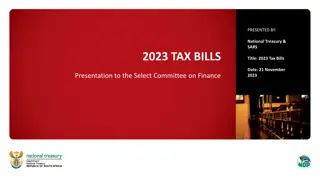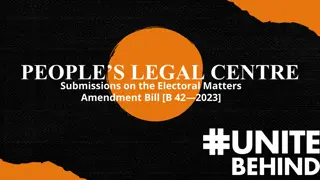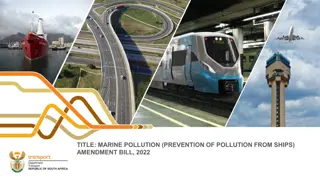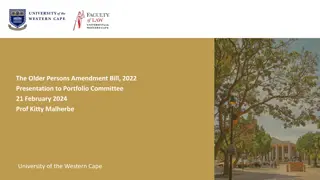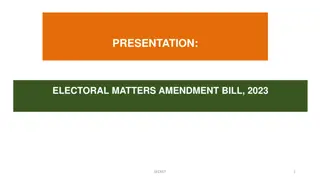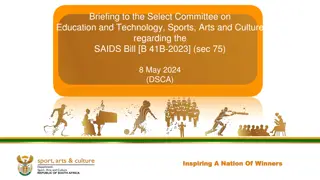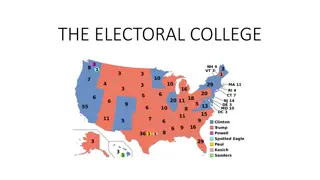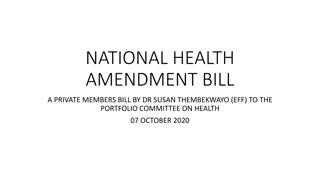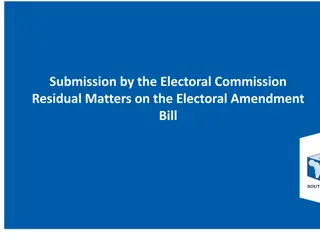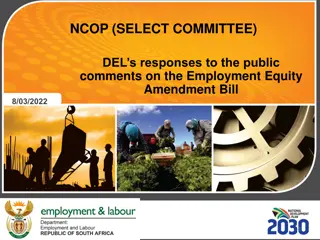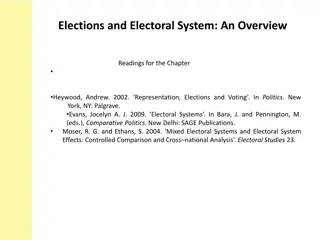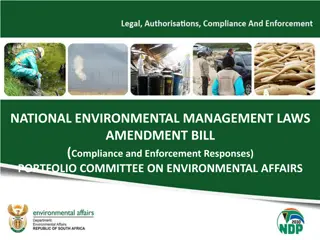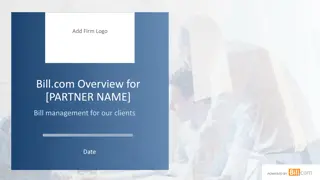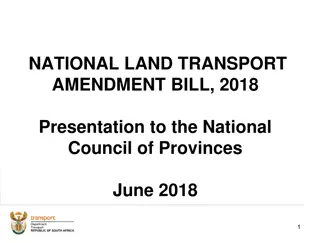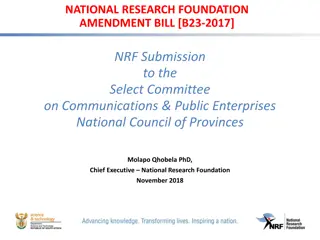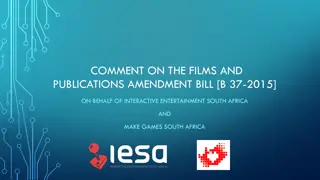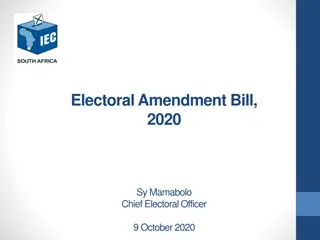Electoral Matters Amendment Bill 42 of 2023 Summary
The Clause Submission Summary for the Electoral Matters Amendment Bill 42 of 2023 discusses key definitions and proposals related to Independent Candidates, Independent Representatives, and the Multi-Party Democracy Fund. It also addresses funding formulas, use of funds, and prohibitions on personal use for litigation costs while considering suggestions from submitters and feedback from relevant authorities.
Download Presentation

Please find below an Image/Link to download the presentation.
The content on the website is provided AS IS for your information and personal use only. It may not be sold, licensed, or shared on other websites without obtaining consent from the author. Download presentation by click this link. If you encounter any issues during the download, it is possible that the publisher has removed the file from their server.
E N D
Presentation Transcript
Clause Submission Summary: Electoral Matters Amendment Bill 42 of 2023
Clause 3: Definitions Proposals: Submitters argued: 1. Simplifying the definition of Independent Candidates to exclude party membership as a disqualifying criterion and rather only excluding those that are nominated on party lists. 2. The Bill's definition of an independent candidate excludes party membership, while the Electoral Amendment Act 1 of 2023 does not. 3. The name of the Multi-Party Democracy Fund to Multi-Party and Independent Democracy Fund is unnecessary as it is clear what the fun is for. 4. The terms donation and donation in kind should reference independentcandidates DHA, Parliament Legal and IEC agree: 1. That the definition of IC/IR should be the same as the definition the Electoral Act. IEC also indicate that including municipal councils may have unintended consequences and make reference to donations. It is proposed: Independent Candidatemeans a South African citizen contesting an election in terms of the Electoral Act, 1998 (Act No. 73 of 1998), and who is not nominated on a list of a party. Independent Representative means an Independent Candidate with representation in the national or a provincial legislatures. donation and donation in kind should reference independentcandidates . 2. 3. Reference to Independentcandidate , independentrepresentative should be made in section 10, independentcandidates in section 14. 4 DHA & IEC: Agree that change of the name of the fund is not necessary
Clause 7 Funding Formula Dealt with under Clause 29 6(3)(a) will need to change if no equitable allocation is decided on 5
Clause 9 Use of Funds 6
Clause 9: Use of Funds allocated and Prohibition of personal use for litigation costs Submitters argued: s7(3)(d) unfairly restricts Political Parties ability to cover legal expenses. Currently Political Parties are prevented in terms of s7(2)(d) from using funds to defray internal political disputes, it is suggested that this existing ban on internal party disputes be retained and that Party s be excluded from the proposed s7(3)(d). Prohibited and allowed uses of donations should be equally applied to Political Partys and Independent Candidates such as for legal costs and immovable property. Suggestion to create a separate subsection or equivalent paragraph for litigation against the party. Section 7(2)(d) of the PPFA only refers to legal costs relating to internal political party disputes and makes no mention of litigation against the party. IEC: That the primary purpose of the section is to prohibit the use of money on intra-party disputes and this must be clearly expressed; The s7(3)(d) should be removed from Bill as it is contradictory and the object and purpose is served by the earlier paragraphs; The provision should also extend to prohibiting garnishee orders against the money held in the Funds by the Electoral Commission. Parliament Legal are of the opinion that the confusion could have been created by the attempt by drafter to create a clause to prevent independent candidates from using funds for internal legal fees, however independent candidates would never have internal party disputes as they are one person. Either the section should be deleted, or re-drafted. Adding Garnishee orders is a substantive submission and would require further investigation by the DHA and would possibly require a call for public comments. DHA agree: words or to cover any costs related to any litigation against the political party or independent representatives. Must be deleted from the new section 7(3)(d). 7
Clause 11: Prohibited Usage Submitters argued: The relevant sections from the Prevention and Combating of Corrupt Activities Act (PRECCA) should simply be incorporated into the PPFA. Bribery prohibition falls short of international law requirements. Parliament Legal: the definition of donation and donation in kind specifically covers money, assets, services paid or lent to a political party and now an independent candidate. PRECCA considers gratification. The inclusion may be misplaced, but further policy consideration may be of assistance. IEC: The Commission views this as a consequential amendment, and submits that training and development may be extended to the support staff of IC or IR. 8
Clause 13: Donation Disclosure IEC: views these as substantive should therefore be deliberated on by the committee parliament, with policy consideration provided by the DHA. Submitters argued: and An amendment should be introduced requiring companies and trusts to disclose their beneficial ownership information when donating to a political party. There is a repeated reliance on intention will be difficult to police / new Constitutional Court ruled that Executive Ethics Code was unconstitutional due to failure to require disclosure of donations to intraparty election campaigns. This principle should be equally applicable to all parties and candidates contesting party leadership. Disclosure thresholds should be removed entirely, and donations should be disclosed
Clause 14: Donation Prohibition Submitters argued: Repeated reliance on intention will be difficult to police. Include IC/IR in the provision to include them in guarding against undue influence DHA agrees that independent candidates and representatives must be included in this provision for certainty of oversight Parliamentary Legal current reading of section 10 prevents any person or entity from delivery of a donation to a member of a political party other than for political party purposes. The new amended s10 creates adds a proviso that no person can make a donation to a political party or a member of a political party in the expectation that it will influence an award of a tender, license or approval etc. . The issue is that the deletion of the of the original 10 required a justification from the DHA. DHA explained that the original s10 criminalised members of a political party receiving gifts. However, Legal disagrees as the definition of donations are specific to funding of political party's and now independent candidates. . 10
CLAUSE 17: Reporting Obligations Party to Account Submitters argued: Registered political parties receipts and accruals are exempted from normal tax. There is no such provision for independent candidates and representatives. The requirement that an independent should register a bank account in their own name means that other types of tax exemption are also not available. Recommendation: Persons intending to contest an upcoming election as an independent candidate may register their intention to do so with the Commission at any time after the preceding election for the same legislature or council. Further inform the Commission of a vehicle established to run campaign, its banking details as well as its relationship with the candidate. From the date of registration, the IC should be treated equally with registered parties for all purposes (campaigning, taxation, disclosure, etc.) IEC agrees that the Act should be amended to include a clause that provides for the registration of intentional or aspirant Independent Candidates at the time when the intention is made known. Parliamentary legal this is a new provision and moves beyond the purpose of the Bill which is to include independent candidates, this requires policy consideration and possibly further public involvement. 11
Clause 18: Independent donation account Submitters argued: Grant tax exemptions and allow diverse juristic person options as campaign structures rather than just sole proprietor for ICs/IRs as is suggested by the bank account of an IC/IR being in their own name. Section ignores the operational and financial requirements of running a campaign as an independent candidate. Suggestion that section 12A(1)(b) should be amended to ensure that the personal accounts of independent candidates are separate from the account used for donations. LEGAL SECTION PROPOSAL. Section 12A (1)(b) provides that an independent representative must keep a separate account with a bank registered as a bank in terms of the Banks Act, into which all money allocated to him or her from the Funds must be deposited . DHA Agrees IEC agrees saying this is consequential as there is a need for ICs to declare their donations as soon as their intention to contest is made known. For the upcoming NPE2024, the ICs will be required to make declarations upon certification as ICs. 13
Clause 19: Repayment of unspent money Submitters argued: This amendment is impractical with respect to political parties, as they can easily fill vacancies, unlike independents. They submit that the new section 13(3) of the PPFA should apply only to independent representatives. IEC: The Commission agrees that the clause is consequential to only IRs and therefore that the new section 13(3) of the PPFA should apply only to IRs and not political parties. 15
Clause 20: Investigative jurisdiction of the IEC Submitters argued: To including independent representatives for consistency and to ensure equal oversight. They also urge the Bill to be examined for consistent use of the terms independentcandidate and independentrepresentative . Section 14(1) and (4) of the Political Party Funding both refer to compliance only by political parties and independent candidates, but not independent representatives The IEC agreeswith the submission that s(14)(a) of the Bill only refers to independent candidates and not independent representatives. The provision should be rewritten to ensure there is no ambiguity. Legal Services: Disagree Section 14 relates to the Commission's duty to monitor compliance by political parties with the Act. The amendment therefore now includes ALL independent candidates, regardless of whether they receive a seat in the NA or provincial legislatures. Therefore, there is no need to include independent representatives. However, this section could be interpreted widely to mean that once an independent candidate gains a seat, the provision does not apply to them. The DHA should advise the policy intention. The DHA advised that the Policy intention is for the IEC to monitor compliance with political parties, independent candidates and independent representatives. For completeness, we propose that independent representatives be expressly included. 16
Clause 24: Penalties for contravention of the PPFA Submitters argued: That the Bill should instead seek to streamline and standardize the manner in which political parties receive donations, empower the Electoral Commission to monitor parties bank accounts, empower the Electoral Commission to refer any suspected breaches of the PPFA to the National Prosecuting Authority and allow for the sharing of financial information about political parties bank accounts held by the Financial Intelligence Centre with the Electoral Commission. 17
Clause 24: Penalties for contravention of the PPFA Submitters argued: Only the maximum donation limit and the total donation limit - will be subject to the three factors listed in Clause 24(1)(b). The disclosure threshold [Clause 9(1)(a)] must also be subject to these factors in line with the memorandum on the objects of the bill. the list of factors in Clause 24(1)(b) should include: the prevalence of public-sector corruption; and the importance of transparency for the exercise of constitutional rights, including the rights in section 19(3) of the Constitution; and the President should be required to consult with the Commission before making regulations affecting disclosure thresholds or limits, or donation limits. Equalize treatment of ICs/IRs with parties regarding permissible and prohibited donations. The provisions of clause 24 appear wholly ineffectual without an enforcement mechanism. The Bill does not specify how donations are to be monitored and by whom. Legal Services: Initially agreed with that s19(4) should include reference to an independent candidates, however on a closer analysis of s19(4), it would appear the s19(4) prevents a person from donating to a member of a political party instead of the political party itself. Legal now questions whether this would be applicable to independent candidates, as they are one person, there would always only be a donation made to the independent candidate and not another person. IEC:The Commission considers this substantive rather than consequential. If there is a view that the Commission s investigative capacity must be strengthened, the same must be a debate in the new Parliament. Also suggests that perhaps the rreference made to Chapter 3 on the Direct Funding of Political Parties in the provision should be removed? Further requests that the fine amount (R200 000.00) should be removed from the Act and be placed in the regulations. Keeping it in the Act would make it too onerous to adjust when the need arises DHA agrees that independent candidates and independent representatives should be included in s19(4). 18
Clause 26: Granting the President discretion in determining regulations 19
Clause 26: Presidents discretion in determining regulations Submitters argued: Strong opposition to this clause, arguing it undermines parliamentary accountability and risks manipulation of thresholds and limits. They advocate for retaining full parliamentary control and delaying the clause until proper public participation in any such amendments. The amendment to section 24 (5) of the Political Party Funding Act which would render the current regulations contained in Schedule 2 of the PPFA transitional which would introduce unnecessary uncertainty into the regulation of the private funding of political parties and independent representatives. The proposed amendment of section 24(1)(a) of the PPFA would remove the requirement that the National Assembly resolve to instruct the President to issue regulations. Propose various alternatives, such as extending the mandate of the Independent Commission for the Remuneration of Public Office-bearers, including the Minister of Finance in the consultation process, requiring the President to consider objectively measurable norms and standards from other democracies, or tying the thresholds and limits to external or objective measures such as the Consumer Price Index or the minimum wage. Legal Section: it could be argued that the President has been assigned plenary power when he used to only act on a resolution of the National Assembly. Furthermore, there is no definition for Minister referred to in the PPFA. Indicated that in consultation is problematic. IEC & DHA: In order to address concerns raised regarding the powers of the President to make regulations in Clause 26(a), we suggest going back to the original formulation which reads as follows: "(1) (a) The President, acting on a resolution of the National Assembly, may by proclamation in the Gazette make regulations in respect of matters contemplated in sections 6(2), 7(2)(e), 7(3)(d) 8(2), 8(5) and 9(1)(a). . This formulation together with the safeguards, viz (i) the amount of money previously appropriated by Acts of Parliament for the Political Representatives Fund within the previous five financial years; (ii) the effects of inflation on the value of money over time; and (iii) the costs associated with participating as a political party, independent representative or independent candidate in elections and the democratic process in South Africa, in our view addresses the issues raised.20
Clause 7 & 29 Schedule 2: Regulations on Party Funding Submitters argued: Increasing proportional allocation to 90% and reducing equitable allocation to 10% will have negative consequences for smaller parties and independent representatives who rely more on equitable allocation. They call for retaining the existing formula and rejecting the amendments. Inconsistencies and contradictions between the proposed amendments to Section 24 and the regulations in Schedule 2 and since regulations may not contradict their enabling legislation, they would be invalid and ultra vires the PPFA once amended. Proposed amendments to regulations 7 and 9 of Schedule 2 should be rejected. The proposed amendments to the regulations also make no mention of the consultation the President is required to have with the Portfolio Committee on Home Affairs and the Minister of Home Affairs, which is introduced by clause 26. South Africa s experience with state capture is illustrative of the importance of adequately regulating the relationship between private interests and politics. The ddisclosure threshold of R100 000 and maximum donation limit of R15 million per year from a single donor should be lower closer to most countries that range from R2 million in Italy to R150,000 in Uruguay. There should be a review of existing practices around public funding of political parties to develop a policy framework regulating all public funding of political representatives to ensure that there is adequate oversight and accountability in political parties spending of public funds to prevent abuse. Amendment Clause 29 (2) (a) to replace 90% of funding with 100%. The deletion of Clause 29 (2) (b) in its entirety from the Act itself. Proposal that every independent and party who wins a seat in Parliament gets 0.25% of funds per seat they occupy (1/400). Current formula of 67:33 developed when few small parties in parliament. The possibility now is many more small parties and independents. ANC used 10 parties and 28 independents of 400 MPs in their submission calculations. For Provincial Legislatures the number of MPLS will determine the split. If there are 50 MPLS each independent MPL would be allocated 2% of the funding available, and each party would receive 2% x number of MPLs for that party The DHA agrees that this suggestion is better one in that it does not result in the negative unintended consequences of the two thirds one third split and it takes care of the concerns raised regarding the 90/10 split. IEC: because of the entrance of new players in the political space (i.e., Independents), this is consequential. The Committee must therefore deliberate on the matter and reach finality. Smaller and independent representatives are likely to be adversely impacted. This might raise discontentment leading to possible court cases on the matter. The rationale behind the change of the equitable percentage will be left to the DHA to advise on. Legal Services- This is a substantive amendment. The amendment reverts to the original formulae. If the change in formulae unfairly discriminates independent representatives or smaller parties, the Committee must be mindful of Harksen v Lane, does the provision differentiate btw people or categories of people? If so, does it bear a rational connection to a legitimate government purpose. 22
Clause 38: Broadcasting for political parties and independents COSATU proposes that the principles of proportionality based on representation in Parliament and the Provincial Legislatures for funding should be cascaded to provisions for broadcasting, instead of treating all parties and candidates equally19. My Vote Counts: Clause 38 Clause 40: The amendments made in the substitution for Section 57, Section 58 and Section 59 of the Electronic Communications Act, 2005 do insert or include the term independent representative under the provisions made for public broadcasting on election broadcasts. Section 57(1), (2), (3), and (4); Section 58(1), (2), and (3); Section 58(7); Section 59(1), (2)(a), and (2)(b), and (3) all do not include the term independent representative . Department of Communications: On the Electronic Communications Act (ECA): The amendments made into ECA are consequential amendments which impacts on ECA to the extent of including independent candidates and independent representatives in line with the judgment by the Constitutional Court. The amendments in question are not substantial. IEC: The Commission is of the view that the matter should be dealt with by ICASA DHA: agrees with the suggestion to include independent representatives 24
not Section amending would exclude independent candidates and independent representatives. Section 23 provides that Parliament or a provincial legislature may not fund represented political parties other than through section 57(2) and section 116(2) of the Constitution. Constitutional Court in the New Nation judgment held that these sections of the Constitution do not negate the possibility independent participating in the National Assembly and the provincial legislature and in turn refer to independent candidates. Therefore section 23(2) of PPFA should be amended to include IR 23 (2) Funding for IC from Provincial Legislatures: Not in Bill S23 of PPFA The Section 23(2) stipulates the responsibilities of the accounting officers to report annually. Neither of these makes mention of independent representatives. of candidates Legal Services: Include independent representatives in section 23(2). IEC AND DHA: Agrees that s23(2) on disclosure of sections 57(2) and 116(2) (parliamentary and legislature) allocations should equally apply to IRs as it does to political parties. 25
Section 27 of the Electoral Act As amended Not in the Bill 26
Clause 31: Voting at different stations Submitters argued: Why is a voter not permitted to vote for regional seats and provincial legislatures in another voting district if they aren t on the voter s roll for provinces? Questioned whether a re-draft may be necessary, the use of the word or . Parliament legal understood that the purpose for the clause was that the allocation of seats per region is determined by the registered population in a region. It follows then that only voters in that region may influence the outcome of the election for that region. However, a greater consideration should be given to the submitters concerns regarding the drafting of this section. IEC: Suggested Reformulation S24A. Provided that such voter may only vote in the election for the regional seats in the National Assembly in terms of Schedule 1A [or] and for the provincial legislature if [his or her name appears on a segment of the voters roll for the province in which that specified voting district is situated that specified voting district is situated in a province within which the voter is registered] that specified voting district is situated in a province within which the voter is registered . S24A is no longer available for application at Voting Stations. It is now only available by pre- notification by a date regulated in the election timetable. The Voter must indicate that other voting station at which the vote will be cast. In the circumstances, it is no longer necessary to keep surplus ballot papers at all 23 000 stations. 29
Electoral Commission Act Omissions SUBMISSION: A number of sections not amended. Namely section 6(2)(b) and (d), section 9, section 20 and section 23. Parliamentary Legal - There have been a number of sections contained in the Electoral Commission Act that refer to political parties only. DHA agrees with the suggestion by Legal IEC - Section 6(2)(b) must be amended to delete the words party-political and replace it with the word political . 30
Electronic Communications Act SUBMISSION: Sections 57(1),(2),(3) and (4), 58(1),(2), (3) and (7) and 59(1), (2)(a), (2)(b) and (3) have not been amended to insert independentrepresentative perhaps a drafting oversight? Parliamentary Legal agrees that these sections will need amending. DCDT Response: Definitions: election period means the period commencing with the date on which the election day is proclaimed and ending on the day immediately following upon the day on which candidates of any of the political parties are declared elected party election broadcast means a direct address or message broadcast free of charge on a broadcasting service and which is intended or calculated to advance the interests of any particular political party political advertisement means an advertisement broadcast on a broadcasting service which is intended or calculated to advance the interests of any particular political party, for which advertisement the relevant broadcasting service licensee has received or is to receive, directly or indirectly, any money or other consideration Sections 56, 57, 58 and 59 needs to be amended. These are not substantial but consequential 31
FMPPLA PARLIAMENTARY LEGAL RESPONSE Bill neglects to make consequential amendments to section 65(1)(f) which speaks to regulations relating to funding of political parties. 32
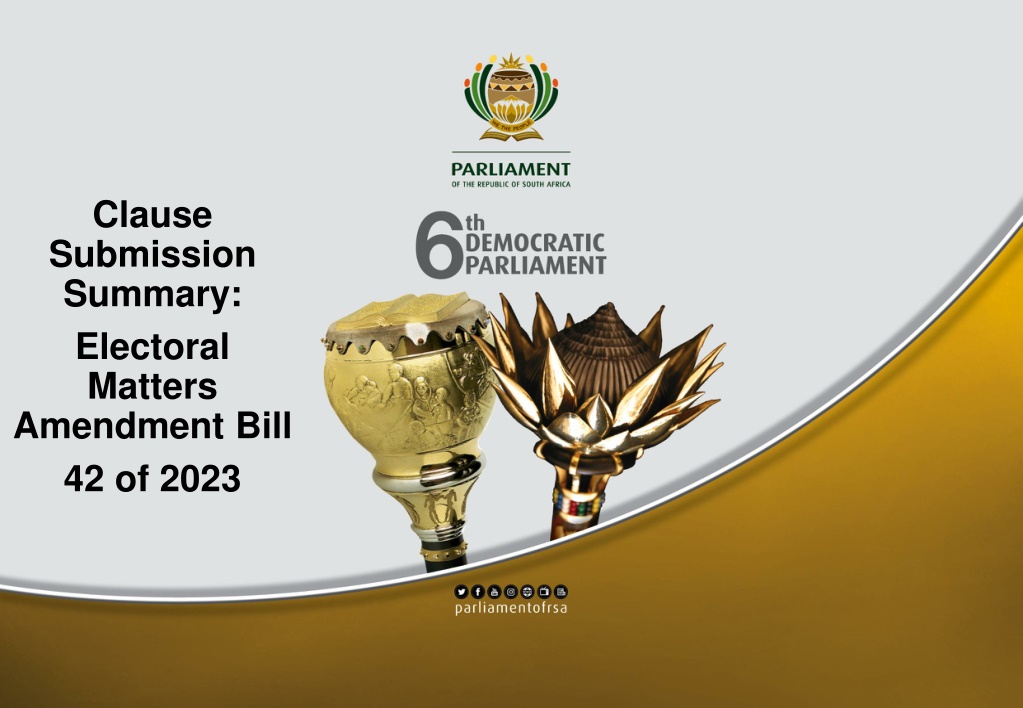

![RE: ELECTORAL MATTERS AMENDMENT BILL [ B42-2023]](/thumb/18837/re-electoral-matters-amendment-bill-b42-2023.jpg)


